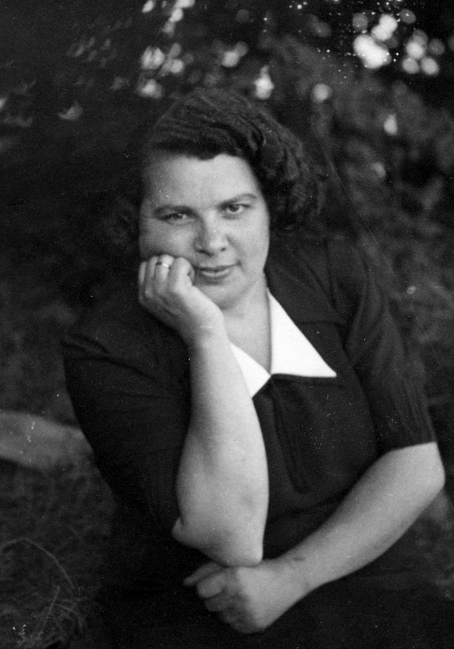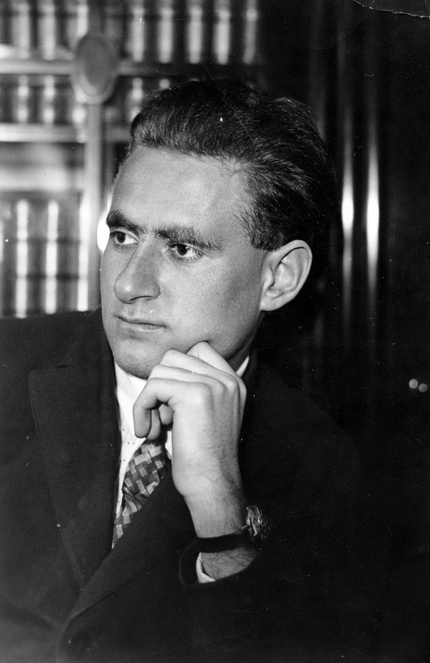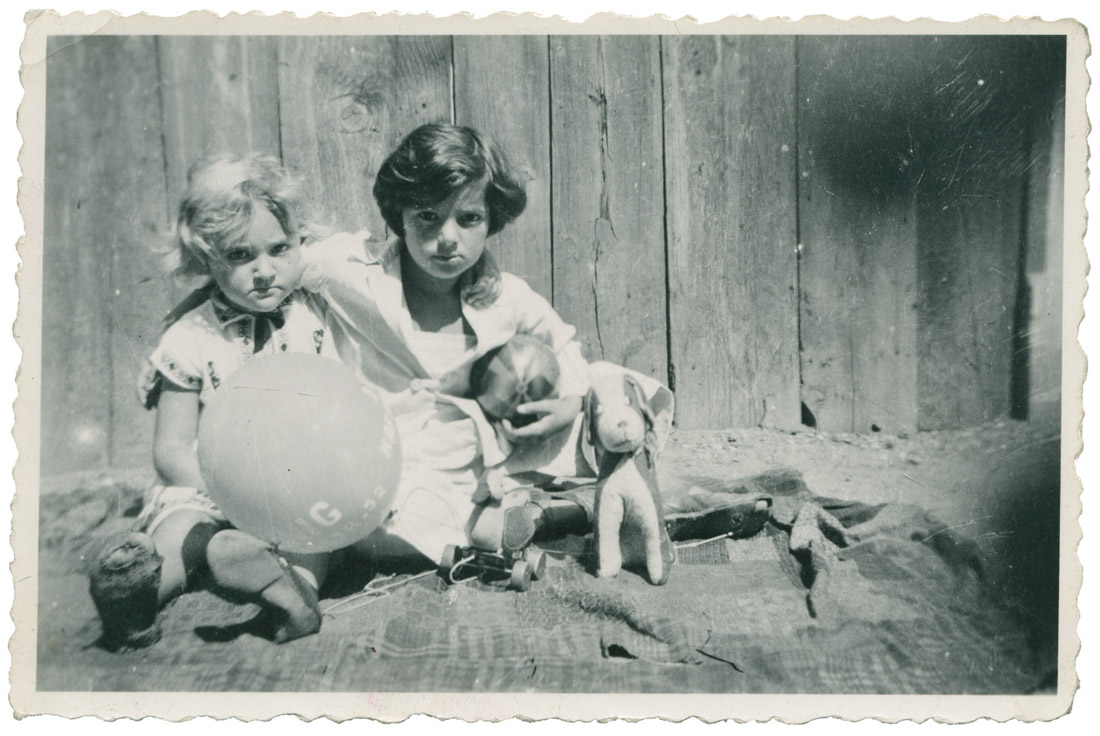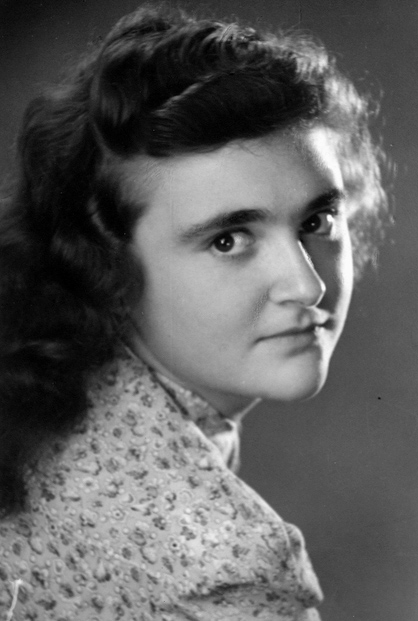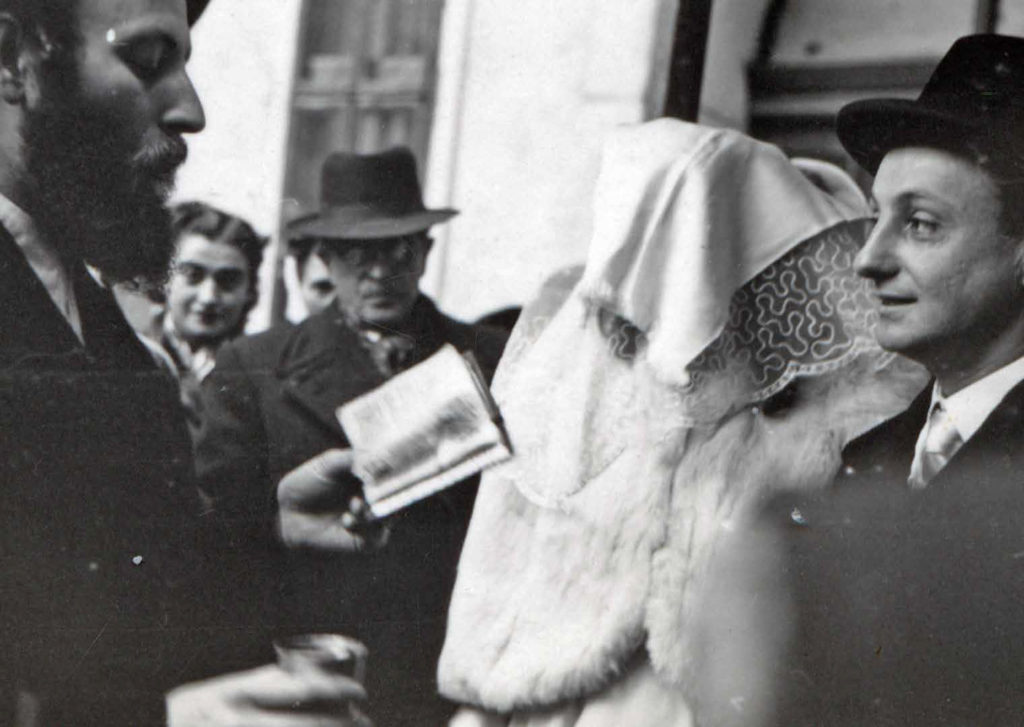Lucia Heilman
In 1914, at the start of the First World War, many people fled Galicia, even my grandparents. Back then Vienna was the capital of the Austro-Hungarian monarchy, and so my grandparents fled with their children to Vienna. Just after the matriculation exam, my mother began her studies in chemistry at the university. Since she didn’t have any money for the doctorate fees, she received her doctorate shortly before my birth.
In 1921 my mother married Leon Steinig in Vienna. Back then they lived at Währingerstrasse 110. Although my mother very soon no longer lived with Steinig, they were only divorced in 1933. So I was born in Vienna in 1929 as Lucia Johanna Treister. My mother and I lived with my grandfather and Fritz Hildebrand, my mother’s boyfriend, in a small apartment at Pappenheimgasse 6 in the 20th district.
My mother worked at the Lainz hospital. My mother worked a lot and in a career with a lot of responsibility, and when she came home she still had to buy and cook everything. But my mother had a lot of energy. Her friends came to visit every evening. My mother was exceptionally talented at attracting people. She was very social, vivacious, and friendly, so that even the men liked her.
My father, Rudolf Kraus, wasn’t Jewish. My parents weren’t married and didn’t live together. My father visited us every week and really cared about me. He played with me for the couple of hours he was with me in our apartment.
My father tried to get us out of Austria. That’s why he had himself transferred by Siemens, where he was working, to Iran, and worked in Iran as a lighting engineer. He wanted to help us with entry into Iran. By the time the English and Russians invaded neutral Iran, a ceasefire treaty had been arranged. This made my father an enemy foreigner and he was interned with many others and then brought to Australia. At first he was in an internment camp. Then he was released and settled in Castlemaine as a mathematics professor.
The Dankner family lived below us. They had four children who I was very good friends with. Erna was just about three years older than me. I often played with her.
On March 12th German troops marched into Austria. I was eight years old and went by myself to Heldenplatz square, since there was an event there. As I reached the vicinity of Heldenplatz square I couldn’t go any further – there were so many people on the Ring Road. I stood there and heard the yells, the roaring, and this cry, “Heil, Heil, Heil…” and I knew that I didn’t belong there. I came home completely distraught.
A short time later the director of the school came into the class and said that the Jewish children had to leave the class. That felt like a terrible humiliation. Exclusion from the classroom, an expulsion, for reasons incomprehensible to me. This humiliation has accompanied me to the present day.
My mother lost her position at Lainz, and one day a couple came and looked at our apartment. They liked it. We had to get out within 14 days and move into a collection flat. My friend Erna, who I’d always played with, was deported with her parents, first to Theresienstadt, and then to Auschwitz, where they were murdered. The person who saved my mother and I from death during this horrific time was named Reinhold Duschka.
In March the air raids began in Vienna. I felt joy. One day in November there was an air-raid alarm. The workshops were on the fourth floor and we went down the stairs. By the time we reached the basement the bombs were already falling. We couldn’t see anything and moved through the dust; there were maybe just a few minutes between the craters made by the bombs. We saw in the courtyard that the fifth floor of the house was gone, there was no more roof, and flames were leaping from the fourth floor.
Then Reinhold said that it may well be very cold, but we need to go to Hütteldorf [part of Vienna’s 14th district] to his summerhouse. It was freezing, there was nothing to cover up with and no heating. A friend of his had a shop on Gumpendorfer Strasse he wasn’t using and gave it to Reinhold. There was a large oven in the shop, and it also had a basement section. First, Reinhold heated up the oven so that we could warm up a little, then we took a look at the basement section, and that’s where we sat in the dark, since the shop had a large display window, meaning we couldn’t stay thereThen Reinhold said that it may well be very cold, but we need to go to Hütteldorf [part of Vienna’s 14th district] to his summerhouse. It was freezing, there was nothing to cover up with and no heating. A friend of his had a shop on Gumpendorfer Strasse he wasn’t using and gave it to Reinhold. There was a large oven in the shop, and it also had a basement section. First, Reinhold heated up the oven so that we could warm up a little, then we took a look at the basement section, and that’s where we sat in the dark, since the shop had a large display window, meaning we couldn’t stay there
The time from November 1944 until April 1945 was very hard for me. I became depressed and unresponsive. The dark cellar, the cold, nothing to do but sit very still in the basement. That was unbearable for me. On April 13th, Reinhold came and collected us. He had seen Russian soldiers. It’s a feeling you can’t describe, how the Russians came and I was finally freed. I was happy, I was blessed, I could finally run where I wanted, and I could sit on every park bench.
My mother went to city hall and got our birth certificates and citizenship documents. The next step was work. We needed money, since we had nothing.
There was a girls’ high school on Albertgasse. In June my mother went with me to the new director –the school had had to dismiss the old Nazi director. The very feeling of being able to go to school was unbelievable; I hopped. I absorbed everything like a sponge. I studied day and night and finished my matriculation exams at the age of 18.
After my exams, I wanted to study medicine. I enrolled and took the first exams in physics and chemistry. Then I received the authorization to leave for Australia. After these experiences in Austria during the Holocaust, I had the feeling that I couldn’t stay. Australia was an option because my father was there. It was a reunion with many tears. You had to pay for your studies and the boarding school cost a lot of money, which my father couldn’t afford. So after a year I decided to return to Vienna in order to study.
One day my future husband, Alfred Heilman, was standing in front of our door. And that was that! Unbelievable! When I saw my husband for the first time, I just looked at him and was already in love. It wasn’t any different for him. My husband and I got married at the civil registry office on Währingerstrasse. My daughter Viola was born in 1955. Viola was at my graduation; she was ten years old. My mother was also there. In 1968 my daughter Monika was born. My husband died in 1995 at the age of 75. I’ve been living alone ever since.
In 1990 my father’s friend, Reinhold Duschka, was recognized by the State of Israel as a Righteous Among the Nations [an honorific for gentiles who saved Jews during the Holocaust]. The honor came so late because Duschka was afraid of the population’s antisemitism after the war, since even in post-war Austria it was not popular to have helped Jews. He still needed to work many years and couldn’t afford to lose his customer base.
On April 11th, 2013, Austria also honored Reinhold Duschka for his heroic deed, for which he had endangered his life for four years. A memorial plaque was placed at Gumpendorfer Strasse 85a, the house where he had hidden my mother and me for years.
